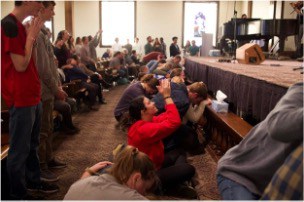A Faithless Generation: How God Freed Gen Z & Began a Global Revival
Published on September 13, 2023
Generation Z is the least-religious generation of our time.
So says everyone.
Yet earlier this year, the Lord poured out His Spirit on the Asbury Campus in Kentucky in a revival that would bring worshippers from all over the country for over two weeks and start a chain reaction worldwide.
The generation perceived as soft and flaky was the recipient of a movement whose ripples can still be felt today.
Could it be Gen Z was getting a bad rap all along? Are they merely mislabeled? What’s God really doing in our young people, and how do we engage this generation into a meaningful relationship with Christ?
We’ll discuss all these in-depth, but before we do, let’s take a trip back to where it all started.
The Outpouring at Asbury
Asbury University in Wilmore, Kentucky, was hosting its regularly scheduled 10 a.m. chapel service on February 8th.
University leaders explained that students stayed late after chapel, continued praying and singing, and didn’t leave.
Attendance felt the presence of God like a flowing river in that place- peace was restored to many while the rest basked in the glory of the Most High. Reticence surrounded those who attended. Should they speak out about the awakening? Or just to be still and receive what the Spirit was doing?

Regardless, by the end of the two-week outpouring, the university received 50,000 students and visitors, and similar prayers began in other Christian campuses, including Lee University in Tennessee, Cedarville University in Ohio, and Samford University in Alabama.
The event garnered nationwide attention from Christian and secular media outlets alike and was the spark that ignited the spreading of the gospel nationwide.
A Generation Mislabeled
The least religious among us seems like an unlikely place for God to do His handiwork- but conditions were ripe for the Spirit to flex the way it did at Asbury.
Could it be that Gen Z has been mislabeled?
Last year, the Survey Center on American Life published “Generation Z and the Future of Faith in America.” The results found that American religious identity had been on the decline for the past three decades and that more than one-third (34%) of Gen Z considered themselves religiously unaffiliated and far more likely to identify as atheist (9%) or agnostic (9%).
The fear from the research team came with the lack of evidence to suggest disaffiliated Americans ever returned to the faith. This had profound implications for the church’s future and civil society.
In that same year, however, Springtide Research Institute found one-third of adult Gen Zers believed in a higher power, up from one-fourth in 2021.
Unaffiliated and faithless are not the same thing.
While it may be true that Gen Z is turning their back on the religion of their parents and grandparents- it does not indicate a rejection of faith itself.
In fact, younger non-Christians are more than twice as likely to express a personal interest in Christianity compared to older non-Christians. The absence of Christian knowledge and orthopraxy has created a void in their spiritual lives and birthed a curiosity to learn more about this Jesus everyone seems so fond of.
Their apostasy is not one against Christ but empty religious practices that failed to produce fruit in their parents and their parents before them.
This generation is looking for a deeper connection with a Savior who doesn’t need to conform to the rules of men- but is willing to see them and engage them in their loneliness and despair.
An Unseen Movement
The event at Asbury went viral.
The godless generation was experiencing a revival, and we were all here for it.
Except…God had been working in Gen Z for years.

Passion conferences, for example, first started in 1997 to reach young adults 18-25. It began with only 2,000 students; the following year, it went to 5,000, growing exponentially with each passing iteration- and now clocks about 50,000 attendants a year.
IF: Gathering a conference for women by women, launched in 2014 and began opening its doors to girls 14 years and older in 2019. In 2020, 500
IF: College sites were streaming the conference nationwide, each hosting a small group of women. In 2021, 1,500 girls attended IF: Lead events to equip them to be leaders for Christ throughout their campus across the US, and in 2022, IF: College sites jumped to 634 host sites involving over 3,000 young women.
And that’s just the impact of two conferences! It doesn’t account for campus ministries, summer camps, and concerts happening all year that also stir up Gen Z.
Pastors on the ground have found youth interest has been growing for at least the last three years. With skyrocketing rates of depression, anxiety, and the isolation caused by the epidemic- Gen Zers are looking for a place to belong and a way to find hope. Skeptical of the religious traditions of the past- they are opting instead for a genuine connection to God that doesn’t adhere to denominational norms.
Gen Z has proven their hunger for the Lord. The question is, what will the rest of us do about it?
Engaging Gen Z

Spiritual but not religious is the hallmark of Gen Z- desperately trying to fill that space in their lives, that they create a spirituality from various influences including but not limited to other religions, books, games, and movies.
These poor substitutes are designed to alleviate personal fears and worries they have about the current church.
How do we begin to engage such a complex group? By doing the following:
- Being genuine. Gen Zers are all about creating and building authentic relationships. Merely adopting world-like characteristics to appeal to them will make shallow Christians and eventually be a turn-off for those seeking a true connection with Christ. Gen Z needs to be taught by someone who loves the gospel whom they can connect with.
- Tailoring our exegesis to address their curiosity. Gen Z has a scientific worldview that requires an explanation of why they should believe as you do. Being scientifically inclined doesn’t deny the existence of the supernatural- but it does mean you have to reconcile the science they know with the God they don’t. Knowing how to explain that science follows God and not vice versa is an excellent way to alleviate their curiosity about how these two worlds converge.
- By inviting them to be active participants in their faith. Gen Zers are visual and auditory learners- meaning they learn best by participating in activities like watching and listening to various forms of media. Inviting them into ministry as subject matter experts to create content that speaks to their generation is a great teaching tool and empowers them to influence their social spheres.
United in Faith
The failure of religion to capture and maintain the attention of its audience is not unique to Gen Z- but a theme that played out in front of them in the lives of their parents and grandparents.
Apathy has been Enemy’s tool to hold Gen Z hostage, but God has broken those chains through a curiosity that yearns to seek His face.
The beauty of Asbury is not that God began a work in our youth but that He made us witness to the crescendo He started building years ago.
Now it is up to us, their mature brother and sisters in Christ, to come alongside them and, in love and grace, expound on our beliefs by creating genuine relationships, extinguishing any doubts and fears, and inviting them to walk out their faith with us- breaking the bonds of indifference once and for all.
Brothers and sisters, let us embrace this sacred responsibility to usher in a revival for all generations, uniting us in faith and love of God.


I agree, apathy is something Christians must overcome to continue to guide a growing population of Christians. Great article!
So glad you enjoyed the article! God is doing great things in our young people.